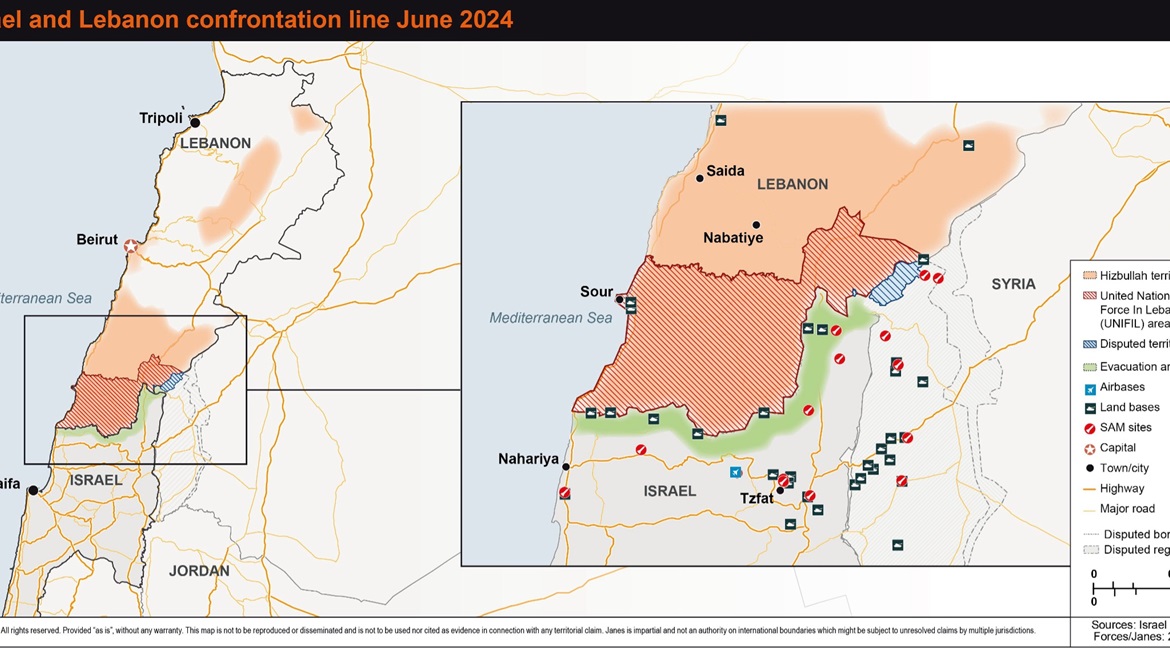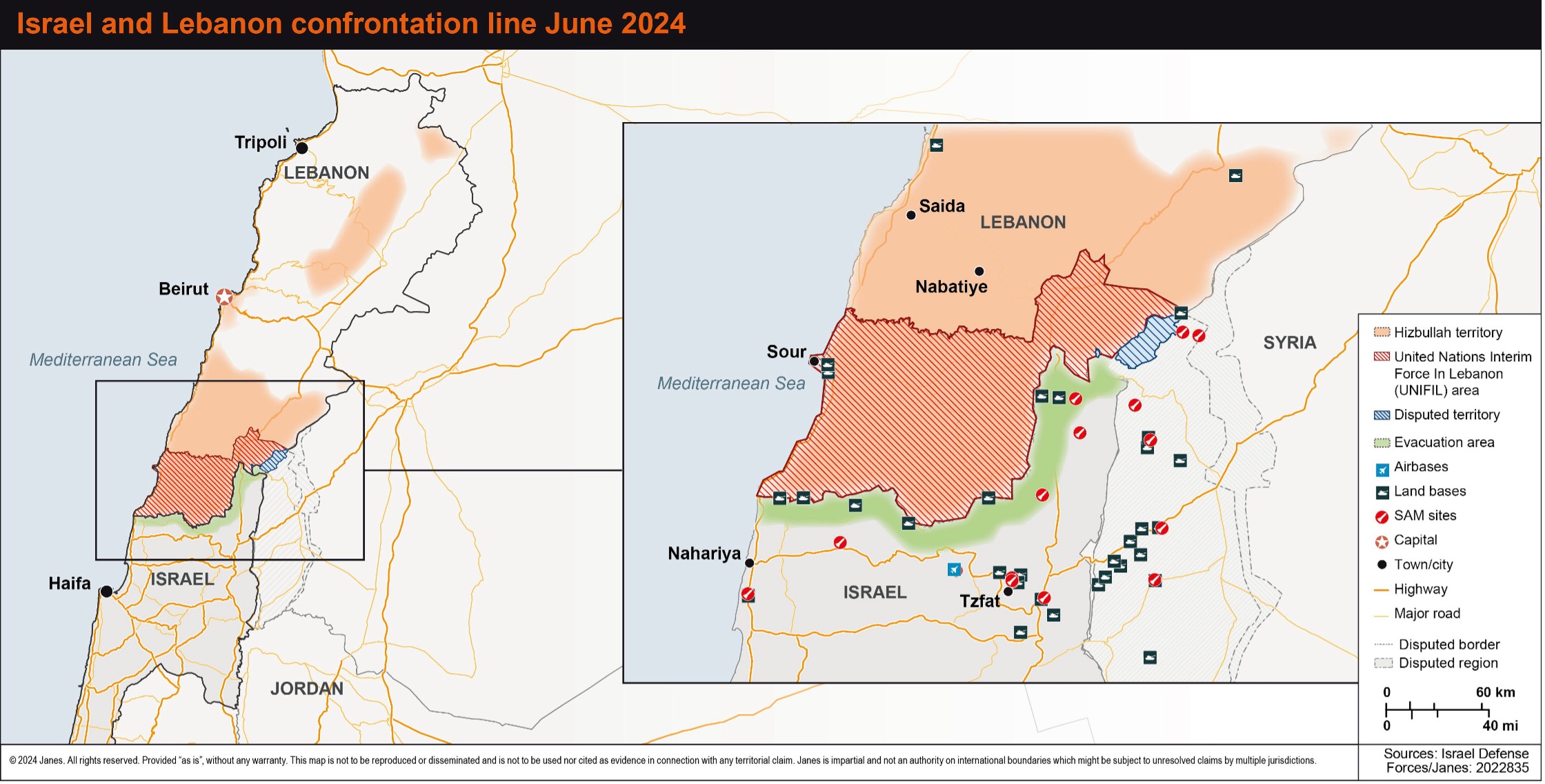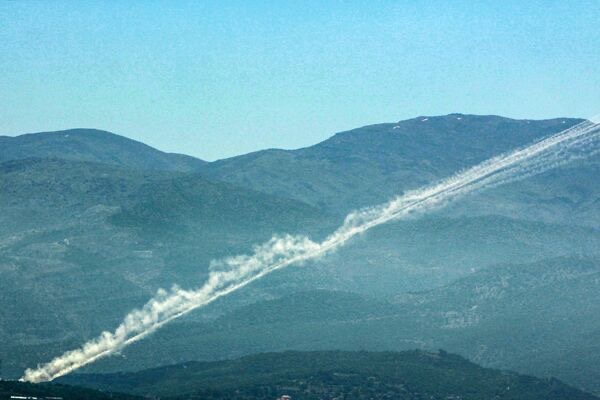
Date Posted: 19-Jun-2024
Author: Elliot Chapman, London
Since 8th October 2023 Israel and Hizbullah have been engaged in a low-intensity attritional conflict that was triggered by the Israel-Gaza war. As this conflict has drawn on, Israeli government and military officials have indicated that without a major change to Hizbullah's presence along its border Israel will be forced to intervene in Lebanon to push the group back and restore security to its northern communities. Elliot Chapman analyses the two scenarios that Israel could pursue to establish greater security along its northern border.
Key points
- There is significant pressure on Israel to conduct a major intervention in Lebanon to degrade or deter Hizbullah and to restore security to its northern communities. The major factors increasing the possibility of a war are rising escalatory dynamics, emergent bellicose Israeli politicians, lack of scope for a negotiated solution, and the current war-footing of Israel. The culmination of these factors could lead to a miscalculation and trigger an intervention.
- Despite continued threat of intimidation by Israeli officials, Janes assesses the most likely scenario in the short to medium term is conflict containment, in which Israel undertakes major security reforms along its northern border ranging from changes to its security posture along its Lebanese border and additional capability development and integration for the IDF, to providing space for a broader multinational strategy to counter Iran and subsequently Hizbullah.
- Although less likely, there is a realistic possibility Israel will trigger an intervention in southern Lebanon. Given the number of constraints on operational success in this scenario, Janes assesses that Israel is very unlikely to achieve a decisive victory against Hizbullah, particularly one that would result in improved security for the country.
Scenarios overview
Despite the Israeli bellicose rhetoric, Janes assesses that the most likely scenario to occur is a long-term strategy of conflict containment whereby Israel reinforces its northern border and delays a decisive conflict with Hizbullah, while taking measures to mitigate Hizbullah's threat on a tactical level and seeking strategic deterrence through other means. The second scenario assessed, which has a realistic possibility of occurring, is a major intervention in southern Lebanon by Israeli forces. In this scenario Israel seeks to conduct a significant military operation to attack Hizbullah's capabilities and deter the group. Janes assesses that while this scenario has a realistic possibility of occurring, it is highly unlikely to succeed. Although a negotiated solution could emerge, progress with these discussions is not forthcoming and is very difficult to assess given the surrounding secrecy.
 Israel and Lebanon confrontation line June 2024. (Israel Defense Forces/Janes)
Israel and Lebanon confrontation line June 2024. (Israel Defense Forces/Janes)
Scenarios summary: Israeli perspectives
| Scenario | Pros | Cons |
|---|---|---|
| Conflict containment (likely) · This scenario is predicated on an eventual ceasefire in the Gaza Strip or de-escalation · Israel undertakes major security reforms including augmentations to the country's security posture in the north, and pursues other deterrence strategies | · The most risk-averse option · Enables Israel to undertake major security reforms · Enables Israel to develop qualitative advantage over Hizbullah in the long term · Postpones conflict · Security reforms could be sufficient to encourage the return to the northern border · Enables strategic deterrence through the formation of strategic partnerships | · Viewed as a strategic victory by Hizbullah · It is likely that the organisation will undertake similar attacks in future periods of high tensions · There is no guarantee of safety for Israeli citizens in the north |
| Intervention (realistic possibility) · Israel has a range of options from massive air campaign to limited ground offensive and air campaign · The most realistic scenario that would impact Hizbullah's capabilities is a major ground manoeuvre inside southern Lebanon | · Israel is currently on a war-footing and can rapidly prepare and undertake military action in southern Lebanon · Israeli forces have undertaken extensive preparations to conduct offensive operations against Hizbullah · Israel has several options for escalation | · There are extensive resource and time constraints on a large Israeli military operation that could cause it to end before any decisive achievement · Any significant intervention will likely trigger a wider war, drawing in other Iranian-backed militant organisations and potentially Iran directly · Decisive support from the United States is uncertain in the current political environment |
Context
Since initiating the conflict on 8 October, Hizbullah's forces have claimed to have conducted 1,973 attacks against Israeli targets. On 16 June the Israel Defense Forces (IDF) claimed that these attacks included launching of over 5,000 rockets, missiles, and unmanned aerial vehicles (UAVs). These attacks have averaged approximately seven per day and have resulted in the deaths of at least 18 Israeli soldiers and 10 Israeli civilians.
Throughout this time, Hizbullah's tactics have gradually shifted from close-range attacks against Israel's border posts and settlements with rockets and anti-tank guided missiles (ATGMs), to deeper, more precise UAV strikes on Israeli military infrastructure. The implications of these shifting tactics are that Hizbullah is gradually learning to overcome Israeli air defences that have historically been seen as robust.
.jpg?sfvrsn=bfad57cf_1) Attacks claimed by Hizbullah against Israel, October 2023 to May 2024. (Janes)
Attacks claimed by Hizbullah against Israel, October 2023 to May 2024. (Janes)
In response to these attacks, Israel has been conducting thousands of precise retaliatory actions, ranging from artillery bombardment or airstrikes against sources of fire to precise airstrikes against high-value targets such as senior Hizbullah officers and weapons storage facilities.
The conflict has forced the evacuation of approximately 100,000 Israelis from the kibbutz, towns, and cities from northern Israel and more than 87,000 Lebanese civilians from southern Lebanon. Israeli evacuations were initiated early on during the Israel-Gaza conflict in October 2023, when the Israeli government acknowledged the risk of a major escalation with Hizbullah. Hizbullah's stated war aims have been to fix and attrite Israeli forces in the north of the country to slow Israel's military progress in the Gaza Strip locking the two sides into a low-level conflict, and put political pressure on the Israeli government through the prolonged evacuation of the northern areas.
This escalating dynamic has greatly reduced Israeli deterrence vis-à-vis Hizbullah and has reignited fears in Israel that Hizbullah could conduct a potential crippling assault against Israel in the form of a cross-border raid like on 7 October or a massed fires attack that would bring about a rapid strategic defeat for Israel. As such this conflict has created the conditions that require Israel to re-establish a permanent strategic advantage and subsequently safety for its northern border communities for the long term.
Hizbullah's attacks, while avoiding uncontrolled escalation, have raised the threshold for a future war with Israel and established an operational precedent that can be repeated, principally attacking Israel during heightened tensions.
Perhaps most significantly, Hamas' raid on 7 October 2023 demonstrated that the threat of an Israeli retaliation was insufficient to protect border communities from a major raid and as of 2024, this is what Hizbullah's current doctrine indicates it is willing and able to conduct. In addition, Israeli trust in its early warning capabilities, principally its intelligence system, has been severely eroded.
Ultimately, the Israeli government and security officials have stated their aim to materially alter the country's ability to withstand an attack from its northern border and reduce the risk of such a situation from occurring. To this end, many senior Israeli government and military officials have indicated that without a Hizbullah withdrawal from its border Israel will be forced to intervene in Lebanon to push the group back.

Rockets leave smoke trails behind as they are launched from southern Lebanon toward Israel on 16 May 2024, amid ongoing cross-border clashes between Israeli troops and Hizbullah fighters. (AFP via Getty Images)
Outlook
Ultimately, any successful military intervention is predicated on Israel being able to deal enough damage to Hizbullah to either materially degrade its capabilities or causing sufficient harm to the group’s domestic interests in the long-term, forcing the group into a degree of capitulation whereby it explicitly or tacitly agrees to withdraw strategic threats from Israel’s border.
To achieve this, Janes assesses that Israel will be required to take, clear, and hold up to 1000 km2 of territory inside southern Lebanon. Success will almost certainly require the deployment of at least three divisions, activating large numbers of reserves and deploying units that have already seen extensive combat in the Gaza Strip. Israel also will likely need to conduct a major and precise airstrike campaign to support both its tactical manoeuvres inside southern Lebanon, and to strike Hizbullah strategic reserves in its rear echelons.
Israel will also need to withstand Hizbullah’s response that could cause major damage to Israeli critical national infrastructure and in the worst case, also trigger a breakdown of an ongoing Israeli offensive. It is also highly likely that the confrontation will quickly expand to involve other Iranian backed militant organisations in Iraq and Yemen, and Iran itself.
Israel’s ability to maintain an offensive is also severely limited by its reliance on its reserves as a core fighting asset of its forces. The economic damage to the already impaired Israeli economy caused by a sustained large-scale mobilisation, may ultimately hasten an Israeli withdrawal faster than any battlefield affects Hizbullah can achieve.
Within these time constraints it is unlikely that Israel could achieve a pre-requisite harm to Hizbullah that would force it to concede some of its most threatening capabilities that Israel is demanding it withdraw.
In addition, decisive support from the United States is uncertain in the current political environment and Israel could be forced to ‘go it alone’.
However, despite the rationale for conflict containment, rising escalatory dynamics, emergent bellicose Israeli politicians, the lack of progress on a negotiated solution, and the current war-footing of Israel could lead to a miscalculation and trigger an Israeli intervention.






